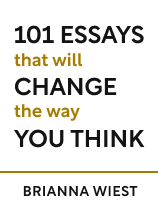

This article is an excerpt from the Shortform book guide to "101 Essays That Will Change the Way You Think" by Brianna Wiest. Shortform has the world's best summaries and analyses of books you should be reading.
Like this article? Sign up for a free trial here .
Are you looking for 101 Essays That Will Change the Way You Think quotes by Brianna Wiest? What are some of the most noteworthy passages worth revisiting?
In 101 Essays That Will Change the Way You Think, bestselling author and poet Brianna Wiest argues that unwanted experiences aren’t to blame for your bad feelings, only your thoughts about these experiences are. Therefore, there’s only one solution to make yourself feel better: Change the way you think.
Below is a selection of passages with explanations.
Brianna Wiest: 101 Essays That Will Change the Way You Think
In 101 Essays That Will Change the Way You Think, Brianna Wiest explores the interplay between your thoughts, your perceptions, and the way you experience life. She explains how your thoughts influence the way you interpret life, why it’s so hard to control how you think, and what you can do to manage your thoughts and feelings about yourself and your experiences.
The following 101 Essays That Will Change the Way You Think quotes highlight some of her key ideas.
“Not everyone will like you. Not everyone will be kind to you. Not everyone will agree with you. That does not mean you have to be unkind in return.”
According to Wiest, your feelings of comfort and happiness are so inextricably linked to how other people react to you that you feel compelled to think about yourself according to how people react to you. She explains it as follows:
- You subconsciously assume that your happiness depends on how other people react to you: When you get positive feedback, you evaluate yourself positively and this makes you happy. When you get negative feedback, you evaluate yourself negatively and this makes you unhappy.
- You only evaluate yourself positively when you believe that others think you deserve positive feedback and reward you accordingly. For example, if your teacher gives you a red cross, you don’t evaluate yourself positively and don’t feel happy, because your teacher thought you didn’t deserve a gold star. On the other hand, receiving a gold star makes you feel happy because it proves that your teacher is pleased with you.
- Because you want to be happy, you manipulate the way you project yourself to invite more positive feedback. This involves making yourself appear more pleasing or impressive—for example, by suppressing supposedly unappealing parts of your personality or chasing status goals to appear more accomplished.
“If you want to master your life, you have to learn to organize your feelings. By becoming aware of them, you can trace them back to the thought process that prompted them, and from there you can decide whether or not the idea is an actual threat or concern, or a fabrication of your reptilian mind just trying to keep you alive.”
According to Wiest, mastering your life requires getting to know yourself. This involves paying constant attention to how you feel so that you can discover who you are and what you need to feel happy. Wiest explains that the more aware you are of your feelings, the easier you find it to challenge and replace the thoughts and behaviors that contribute to your unwanted feelings.
How can you develop an awareness of how your thoughts create your feelings? Wiest suggests that being mindful will help you to shift your focus from the external (other people, your circumstances) to the internal (your feelings). This, in turn, will help you separate how you feel about yourself from how you imagine other people think about you. As a result, you’ll be able to think more clearly about what’s important to you and what you need to feel happy.
“You think your past defines you, and worse, you think that it is an unchangeable reality, when really, your perception of it changes as you do.”
Wiest claims that this process of interpretation isn’t limited to the present moment. Your thoughts also impact the way you experience memories of the past or expectations for the future—because you project your current state of mind onto whatever you think about. This explains why your feelings about the past or future often fluctuate depending on your current mood.
(Shortform note: The psychological term “mood-congruency” explains why memories and expectations change according to your mood. You rely on your imagination to construct your memories and expectations. However, your emotions and imagination are inextricably linked—meaning that your current emotions determine the emotional content of your recollections or expectations.)

———End of Preview———
Like what you just read? Read the rest of the world's best book summary and analysis of Brianna Wiest's "101 Essays That Will Change the Way You Think" at Shortform .
Here's what you'll find in our full 101 Essays That Will Change the Way You Think summary :
- Why the only way to make yourself feel better is to change the way you think
- How social conditioning influences the way you unconsciously think
- How to manage your thoughts and feelings about yourself and your experiences






